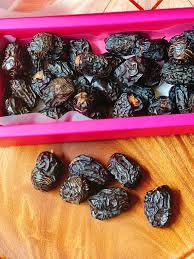
Kurma Nabi: Unveiling Sugar Content in Dates and Dried Fruits
Kurma Nabi, a respected date variety, might be your favorite for its taste and texture. But with all that sweetness, you might wonder how these dates stacks up against other popular dried fruits. This blog post delves into the world of natural sugars in dates, comparing this variety and its brethren to favorites like raisins and apricots. We’ll unveil the facts about sugar content and explore how these delightful dried fruits can be enjoyed as part of a balanced diet. Get ready to satisfy your sweet tooth and your curiosity!
Kurma Nabi: A Sweet Delight
- A Natural Treat: Kurma Nabi’s sweetness comes from natural sugars present in the fruit itself.
- Beyond Sweetness: This post explores the sugar content of dates, including Kurma Nabi, in comparison to other popular dried fruits.
The Sugar Showdown: Dates vs. Other Dried Fruits
Dates, including Kurma Nabi, pack a sweet punch, but how do they compare to other dried fruit favorites?
- Dates: Dates are naturally high in sugar, with some varieties like Deglet Noor containing around 65 grams per 100 grams of fruit. Kurma Nabi falls within this range, offering a delightful sweetness.
- Raisins: Raisins, concentrated sources of grapes’ natural sugars, can contain around 64 grams of sugar per 100 grams. This makes them comparable to dates in terms of sugar content.
- Apricots: Apricots, while sweet, generally have a lower sugar content than dates and raisins. Dried apricots typically contain around 51 grams of sugar per 100 grams.
- Figs: Figs offer a unique sweetness, with around 63 grams of sugar per 100 grams. However, their higher fiber content can help regulate sugar absorption.
It’s important to note that these are averages, and sugar content can vary depending on the specific variety, ripeness, and drying process.
Understanding Natural Sugars: Beyond the Numbers
While dates like Kurma Nabi are high in sugar, it’s important to consider the type of sugar:
- Natural Sugars: The sugars in dates are primarily fructose and glucose, which are naturally occurring sugars found in fruits.
- Fiber Factor: Dates also contain fiber, which can help slow down sugar absorption into the bloodstream.
- Moderation is Key: Even with natural sugars, enjoying dates like Kurma Nabi in moderation remains important for a balanced diet.
Understanding the type of sugar and the presence of fiber helps paint a more complete picture.
Kurma Nabi and You: Enjoying Dates in a Balanced Way
The sweetness of these dates and other dates can be enjoyed as part of a healthy lifestyle:
- Portion Control: Be mindful of portion sizes when enjoying dates. A small handful is a great way to satisfy your sweet tooth without going overboard.
- Pair with Protein or Fiber: Pairing dates with protein or fiber sources like nuts or yogurt can further slow down sugar absorption.
- Natural Sweetener: Dates can be a natural sweetener alternative in baking and cooking, reducing the need for added sugars.
Conclusion: The Sweet Truth About Kurma Nabi: Embracing Dates in Moderation
The story goes beyond the sweetness of these dates:
- Kurma Nabi: They serve as a reminder of the inherent sweetness of dates.
- The Sugar Showdown: This blog post explored the sugar content of dates revealing that they are naturally high in sugar when compared to other dried fruits like apricots. However, the type of sugar (fructose and glucose) and the presence of fiber offer a more nuanced perspective.
- Understanding Natural Sugars: We discussed the importance of considering the type of sugar and the presence of fiber when evaluating the sugar content of dates.
- Kurma Nabi and You: The post offered tips for enjoying dates in a balanced way, including portion control, pairing with protein or fiber, and using them as a natural sweetener alternative.
-
Kurma Nabi, like many other dates, boasts a naturally sweet taste due to the presence of fructose and glucose.
-
Dates are generally higher in sugar content compared to other dried fruits like apricots. However, the type of sugar (natural) and the presence of fiber provide a more balanced picture.
-
When comparing sugar content across dried fruits, keep in mind these numbers are averages and can vary depending on the specific variety, ripeness, and drying process.
-
While these dates and other dates are delicious, enjoying them in moderation is key for a balanced diet. Here are some tips:
- Practice portion control – a small handful is a satisfying treat.
- Pair dates with protein or fiber sources like nuts or yogurt to regulate sugar absorption.
- Explore using dates as a natural sweetener alternative in baking and cooking.
By following these tips, you can indulge in the delightful sweetness of these dates and other dates while maintaining a healthy lifestyle. Remember, moderation is key!